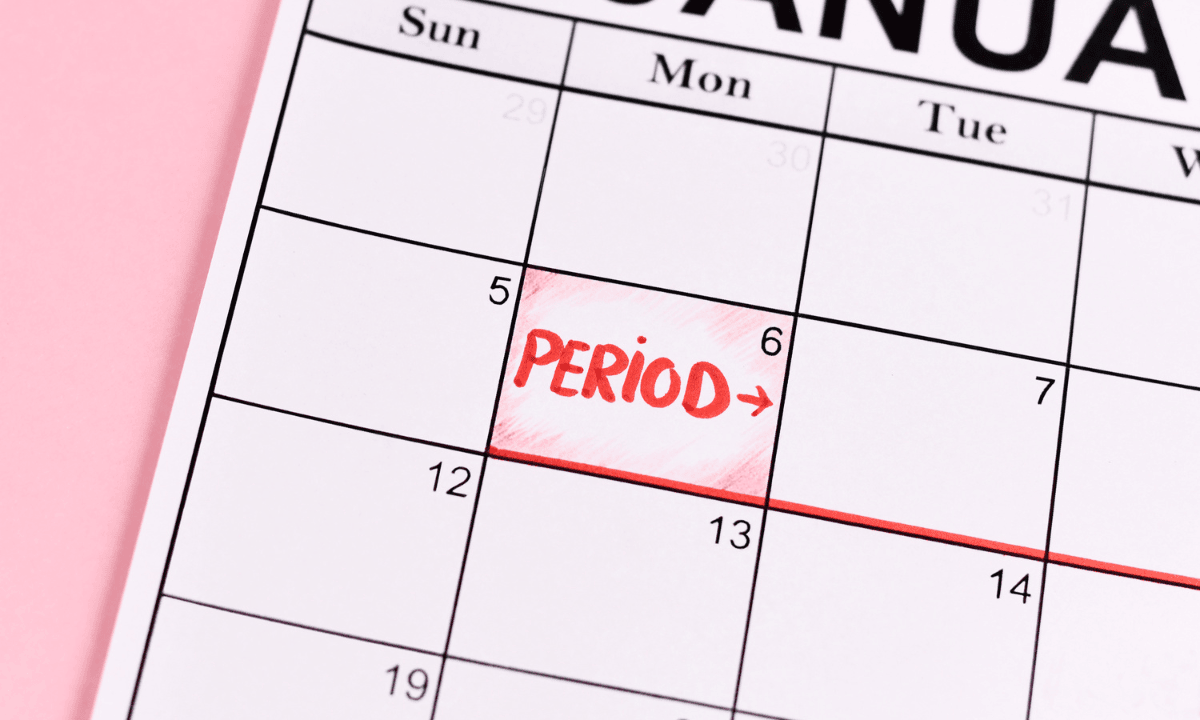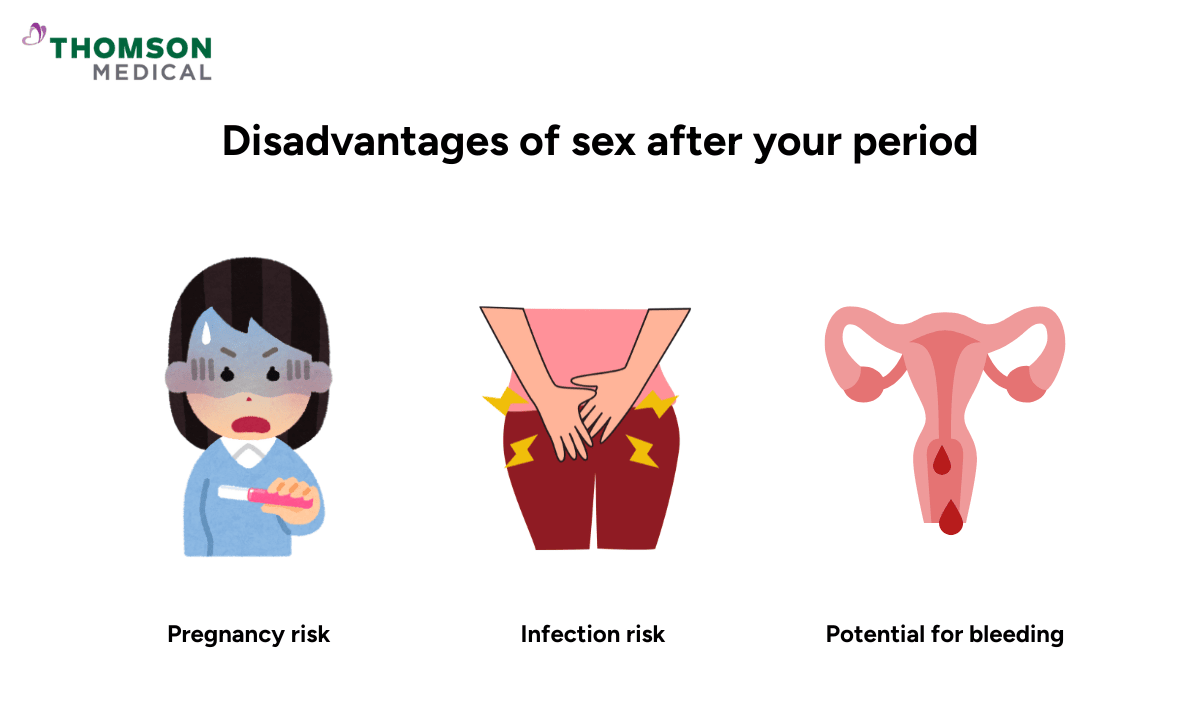After your period ends, you might feel ready to resume sexual activity, but uncertainty can hold you back. Can you still get pregnant? Are you at risk for infections? You're not overthinking it. These concerns are more common than you might think. Knowing what's actually happening in your body during this time can help you make informed choices that feel right for your reproductive health and intimacy.
Is it safe to have sex after your period?

It’s generally safe to have sex after your period, but it isn’t completely risk-free. You can still get pregnant, especially if you have a short or irregular menstrual cycle. This is because ovulation (the release of an egg from the ovary) may occur soon after your period ends.
You can lower the risk of pregnancy by using contraception and protect yourself from sexually transmitted infections (STIs) by using condoms. Condoms are always a good choice, even when pregnancy risk is low.
Can you get pregnant after your period?
Yes, it’s possible for you to get pregnant from sex after your period ends. This is more likely if you have shorter or irregular menstrual cycles. While ovulation usually occurs around the middle of the cycle, it can sometimes happen earlier than expected. Sperm cells can survive inside your reproductive tract for up to five days, so if you ovulate shortly after your period ends and have sex during this time, conception (when sperm fertilises an egg) can occur.
Because ovulation timing can vary from month to month, understanding your cycle can be helpful — whether you’re trying to conceive or avoid pregnancy. If you’re hoping to conceive, tracking your ovulation may improve your chances. If you’re not planning a pregnancy, using contraceptive methods consistently remains the most reliable way to prevent it.
What are the benefits of sex after your period?
After your period ends, your body goes through hormonal changes. Here's what you might experience:
Mood and energy:
Rising oestrogen (a female hormone) levels naturally increase your energy and sex drive.
When you have orgasms, they trigger serotonin and dopamine (feel-good hormones), helping you feel relaxed and happy.
Physical benefits:
When you have sexual intercourse, it releases endorphins (natural painkillers) that can ease any lingering menstrual cramps or headaches you may still have.
The feel-good hormones help reduce your tension and anxiety.
Hormonal release after sexual intercourse promotes restful sleep, which supports your overall health.
What are the disadvantages of sex after your period?

While sex after a period is generally safe, there are some risks you should be aware of:
Pregnancy risk:
Even though your period has ended, your body may still be in a phase where conception is possible.
If you have short menstrual cycles, ovulation can occur sooner than expected, and sperm can survive in your body until ovulation occurs.
Infection risk:
Having sexual intercourse increases your risk of sexually transmitted infections (STIs) and urinary tract infections (UTIs).
Bacteria can enter your urinary tract during sexual intercourse, which may cause you to experience burning or discomfort when urinating.
Potential for bleeding:
You may notice light bleeding if your period hasn't fully ended. You might experience this due to friction during sexual intercourse or residual menstrual blood (leftover blood from your period).
Our O&G specialists
Loading...
How can you practise safe sex after your period?
Your period might be over, but it's still important to protect yourself. Always use condoms during sex to lower your chances of pregnancy and sexually transmitted infections. It’s also a good idea to get tested for STIs regularly, especially if you have a new or more than one partner.
Remember, “safe days” can be difficult to predict because ovulation and sperm survival differ for everyone. You can track your cycle by monitoring your basal body temperature and cervical mucus (the fluid from your cervix), but these methods aren’t fully reliable unless you’re also using birth control.
When should you be cautious about sex after your period?
You should be extra cautious if your menstrual cycle is short or irregular or if stress, illness, and lifestyle changes make ovulation unpredictable. During these times, using reliable birth control consistently is the best way to protect yourself from both unplanned pregnancy and STIs.
What factors can increase pregnancy risk after your period?
Even if the chances seem low, certain factors can make pregnancy more likely after your period.
Short or irregular cycles:
If you have short or irregular menstrual cycles, your ovulation may occur sooner, creating a fertile window (the days when you can get pregnant) right after your period.
Sperm survival:
Sperm can remain alive inside your body for several days, waiting for an egg to be released.
Unpredictable ovulation:
Stress, illness, or your lifestyle changes can shift your ovulation timing, making it harder for you to predict.
If you often experience irregular cycles or unexpected spotting, request an appointment with Thomson Medical. Our specialist can help you to better understand your ovulation timing and choose a birth control method that suits your body.
Why is a barrier method important?
If you’re unsure about your exact fertile days or have irregular cycles, barrier protection offers protection in more ways than one:
Pregnancy prevention:
Condoms provide you with an easy, effective way to avoid unplanned pregnancy.
STI protection:
They act as a barrier against infections spread through vaginal, oral, or anal sex that could affect you.
Reducing irritation:
If you're prone to sensitivity, condoms can help prevent spotting or discomfort after sexual intercourse.
When should you see a doctor after your period?
You should see a doctor if you experience:
Persistent bleeding after sexual intercourse or between periods
Pain or burning when you have sexual intercourse or when you urinate
Severe headaches after sexual intercourse that don’t go away
Lower abdominal pain that continues even after your period ends
Your doctor may perform a pelvic exam (a physical check of your reproductive organs) or suggest other tests to find the cause. Many of these issues are easily treated once properly diagnosed.
If you are worried about pregnancy, emergency contraception can be discussed with your doctor or pharmacist.
FAQ
Is sexual intercourse right after a period more pleasurable?
Yes, sex right after a period can be more pleasurable for some due to rising hormone levels that can increase arousal and sensitivity. The natural lubrication from your period may also make sex feel smoother and more comfortable. Everyone’s body is different, so pleasure varies from person to person.
Does sexual intercourse after my period affect my cycle?
No, sexual intercourse itself doesn’t change your menstrual cycle. You may notice light spotting (small traces of blood) or mild cramps after sexual intercourse. This can happen when the uterus contracts or releases leftover menstrual blood. These effects are temporary and not harmful.
Should I use protection even if I just finished my period?
Yes. You can still get pregnant right after your period because sperm can survive in the body for up to five days. If you ovulate soon after your period, fertilisation can occur. Using condoms not only helps prevent pregnancy but also protects against STIs.
Can you get an STI from sexual intercourse after your period?
Yes. STIs can spread any time you have unprotected sex, regardless of where you are in your cycle. Using a condom is the most effective way to protect both you and your partner.
When is the safest time to have sexual intercourse?
There isn’t a completely “safe” time to have sexual intercourse without contraception. The risk of pregnancy is lower during your period and the days just after, but sperm can live inside your body for several days, and ovulation isn’t always predictable. Reliable contraception is the only way to prevent pregnancy.
How many days after a period is sexual intercourse safe?
For someone with a 28-day cycle, ovulation usually happens around day 14. This means the fertile window is roughly from day 9 to day 16. The days before day 9 and after day 17 may carry a lower chance of pregnancy, but this can change if your cycle is shorter or longer. If you want to avoid pregnancy, always use contraception.
The information provided is intended for general guidance only and should not be considered medical advice. For personalised recommendations and tailored advice based on your unique situations, please consult a specialist at Thomson Medical. Request an appointment with Thomson Medical today.
Reference:
Kölle, S. (2022b). Sperm‐oviduct interactions: Key factors for sperm survival and maintenance of sperm fertilizing capacity. Andrology, 10(5), 837–843. https://doi.org/10.1111/andr.13179
Reed, B. G., & Carr, B. R. (2018, August 5). The normal menstrual cycle and the control of ovulation. Endotext - NCBI Bookshelf. https://www.ncbi.nlm.nih.gov/books/NBK279054/
For more information, contact us:
Thomson Specialists (Women's Health)
Thomson Women's Clinic (TWC)
- Novena:
6592 6686 (Call), 8611 8986 (WA) - Bukit Batok:
6569 0668 (Call), 8686 3525 (WA) - Choa Chu Kang:
6893 1227 (Call), 8282 1796 (WA) Jurong:
6262 8588 (Call), 6262 8588 (WA)- Katong (female doctor):
6970 2272 (Call), 8611 9020 (WA) - Punggol:
6243 6843 (Call), 8811 0328 (WA) - Sembawang: 6753 5228
- Sengkang: 6388 8125
- Serangoon (female doctor): 6382 3313
- Tampines: 6857 6266
- Tiong Bahru: 6276 1525
